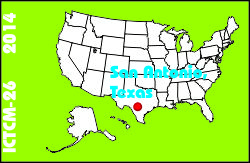
Electronic Proceedings of the Twenty-sixth Annual International Conference on Technology in Collegiate MathematicsSan Antonio, Texas, March 20-23, 2014Paper S104
Student Characteristics That Help Predict Success in Calculus: Results From a Summer Precalculus Program |
Sandra B. NiteTexas A&M University TAMU Mail Stop 4232 College Station, TX 77843 snite@math.tamu.edu list of all papers by this author | G. Donald AllenTexas A&M University TAMU Mail Stop 3368 College Station, TX 77843 dallen@math.tamu.edu list of all papers by this author |
| Click to access this paper: |
ABSTRACT
College mathematics is often considered to be a gatekeeper for students pursuing a degree in almost any field. More specifically, calculus is often the gatekeeper for students pursuing STEM degrees and careers. At Texas A&M University (TAMU), students who wish to study engineering must complete or be concurrently enrolled in calculus in order to take the first engineering course. Historically, TAMU students, like others across the United States, often have difficulty successfully completing the calculus sequence needed for their majors (Bressoud, Carlson, Mesa, & Rasmussen, 2013; Hensel & Hamrick, 2012; Pyzdrowski, Sun, Curtis, Miller, Winn, & Hensel, 2012). Additionally, a strong predictor of persistence in engineering is extent of success in the first year of college calculus (Minichiello & Hailey, 2013). In fact, success in mathematics increases student motivation for further success (Halcrow & Dunnigan, 2012). In order to provide additional support for students to begin the calculus sequence the first semester of enrollment and to increase the achievement level, the Department of Mathematics at Texas A&M University, through a grant from National Science Foundation (NSF - DUE 856767), created a summer precalculus intervention. The Mathematics Placement Exam (MPE) was an important predictor of success in engineering calculus at TAMU, and students who participated in a summer precalculus program in addition to taking the precalculus course were more successful than students who did one or the other (Nite, 2012).Keyword(s): calculus, precalculus
